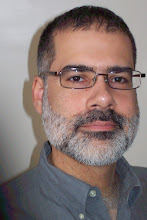A friend of mine recently brought me an article that appeared in the New York Times. Entitled, "How Yoga Can Wreck Your Body," by William J. Broad, this article has been making the rounds on Facebook and other sharing sites, and is creating quite a buzz out there in the blogo/twitter/sharing-verse. As pointed out in an article in the British paper The Guardian, proponents have been knocked off their yoga mats and are anything but serene about the article and its allegations.
Perhaps this should come as no surprise, as The Guardian notes that yoga is now a $5 billion a year industry; mats, tapes, DVDs, classes. If there's one thing I've learned over the years, it's that no industry likes to be attacked, and it will retaliate, no matter if they espouse a philosophy of inner peace and balance.
Having studied and taught taijiquan for some time, it's not hard to see how injuries occur in a class setting like yoga. Simply put, people's egos get in the way of the actual learning; both the ego of the teacher and the student (I'm guilty of this also). People in packed yoga classes can get bullied into trying postures, or asanas, that are simply beyond their point of development (teacher ego), or the over-enthusiastic pupil can try things that are too advanced for him/her (pupil ego). Years ago, I taught a free taiji class under the Queensboro bridge, and I kept trying to get one student to practice a basic posture. Inevitably, she'd sneak over to where I was with the more advanced pupils, and try to do what they were doing. Patience often times is not a quality you find in abundance.
Srila Bhaktivedanta Prabhupada, in his seminal book, "Bhagavad Gita: As It Is," said of yoga, "Unless the mind is controlled, the practice of yoga (for show) is simply a waste of time." He also goes on to denigrate the enthusiastic practice of hatha yoga and its popularity in the West. For a guru like Prabhupad, yoga is not about exercise, but about union with the Supreme, and without that, there is no yoga.
Although perhaps a bit extreme in his outlook, Prabhupad does touch on an important aspect to all these practices, be they yoga or taijiquan; that is the role of the mind. All such practices are for helping to control the mind and curbing ego; not strengthening ego by taking pride in what posture you can do. Perhaps this kind of pride is inevitable; people naturally take pride in their achievements, in something they worked hard to acquire. But the ones who have achieved ability through hard work are also the ones most apt to recognize the arduousness of the journey, and should be the ones to advice caution, and patience in these practices, not haste. Sometimes, of course, these high-level teachers also forget what it was to have been a beginner, and try to hurry their charges along, but that doesn't result in ability so much as it does with injury.
Studying taiji under Mr. Yu was this type of experience. Mr. Yu, in his late 60s and early 70s, was able to do things that most people one-third his age could not do. The discipline he had over his own body was awe inspiring. As a form instructor, he was very exacting and demanding. But, for me, after three years or so of studying his form, I had to leave him. My knees couldn't take it. I had to find another way, and I did, in the taiji forms of Yang Zhenduo and his grandson and heir, Yang Jun. One has to find the way that fits them, and not contort themselves to fit the way of another, and this, also, ties in with mind.
When your practice flows, and everything is as it should be, the mind can become quiet. You can be absorbed in what you're doing, rather than in stretching for something you're not ready for. When I teach class these days, I'm aware of how much my students are ready for and how much they can strive for. I don't insist on deeper stances, only what the person can do. I do try to encourage them to stretch, but not past their limits. Limits may readjust, but this is a process of growth, not force. When the mind is calm, limits are seen as milestones, and not as barriers to punch through.
So, maintain your practice, but do it mindfully. Use this practice to curb your ego, not enlarge it.
Subscribe to:
Post Comments (Atom)

Though I had studied with yogis and not in a class setting i too fell into a Western approach towards yoga. Often I would even rush through the sequence I had chosen in order to get it in on a busy day. Then one May I decided that I would only do yoga if I had time to enjoy it. I found that the routine I normally did in around an hour (if I wasn't rushing) went much better if I took two or three hours to do it. I didn't have that time every day so I was only able to do yoga three or four times a week. Still, the results were amazing. I did increase my flexibility but more importantly I caught up with myself. It was the only time that the yoga truly infected my daily life.
ReplyDelete